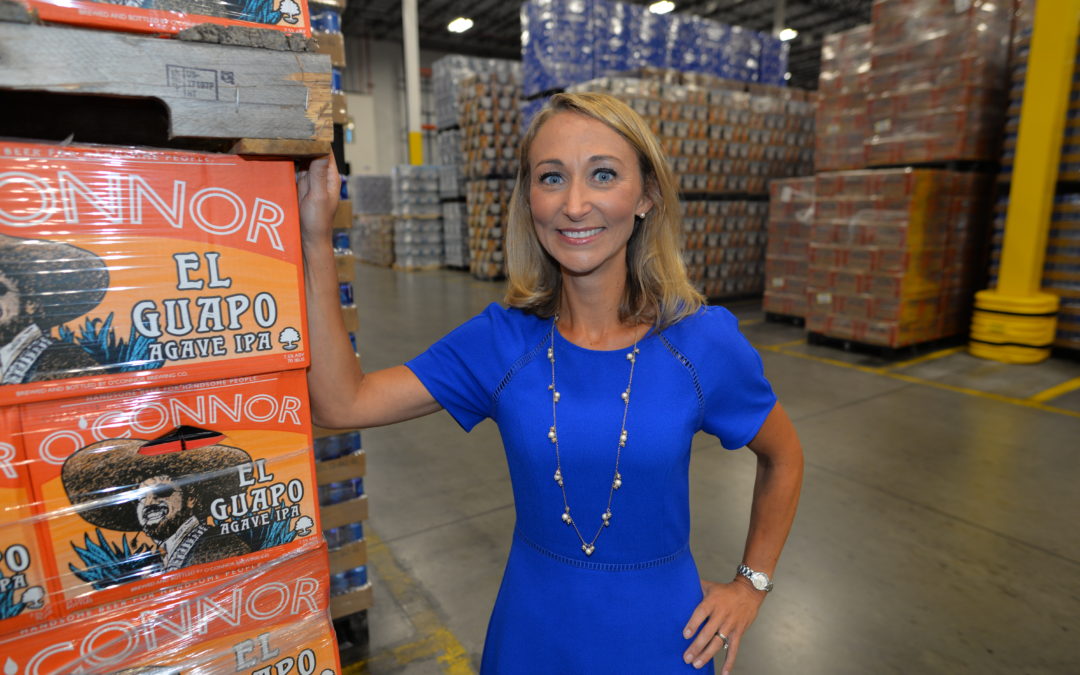(Katherine Hines is President of Hoffman Beverage Company)
By Jeff Maisey
Teamwork.
If you spend any time on the floor within Hoffman Beverage Company’s sprawling warehouse on South Military Highway in Chesapeake you’ll see it in action.
Ask the guy driving a forklift hoisting pallets of Bud Light or O’Connor El Guapo IPA what the secret is to keeping the packaged liquid flowing and the first thing to roll off his tongue is “teamwork.”
Over and over, the same sentiment is credited for the distribution company’s success, from those who drive the large 18-wheeler trucks and deliver each case or keg of Smartmouth Alter Ego Saison to restaurants, grocery stores, 7-11 connivence locations, and outdoor festivals to sales account representatives who maintain these accounts, take the orders and relay them from their electronic tablet to the warehouse so each daily order can be shrink-wrapped and loaded onto vehicles for transportation.
Managing this workflow is a highly knowledgeable executive team that includes David Blake (Vice President of Business Development), Brandon Smith (Vice President of Operations), Greg White (Vice President of Imports, Crafts & Specialties), Mike Sharber (Director of Warehouse Operation), Ted Spencer (Director of Delivery), Greg Bowman (Director of Sales Operations), Gary Shepard (Vice President of Finance), Kate Callan (Marketing Manager), Troy Lewis (Director on Convenience), Aaron Hines (Vice President of Sales), Scott Beasley (Director of Grocery) and Chris Little (Director of On-Premise).
You might think a large operation such as Hoffman Beverage Company is part of some giant national corporation, but it’s not. Today, the company is a family-owned, woman-owned beverage distributor led by 4th generation Chairwoman Robin Ray and 5th generation Vice-Chairwoman/President Katherine Hines.
So how did it all begin?
The company was established in Norfolk on August 5, 1919 as the Hoffman Cigar Company by brothers J. H. Hoffman, G. B. Hoffman and R.M. Hoffman.
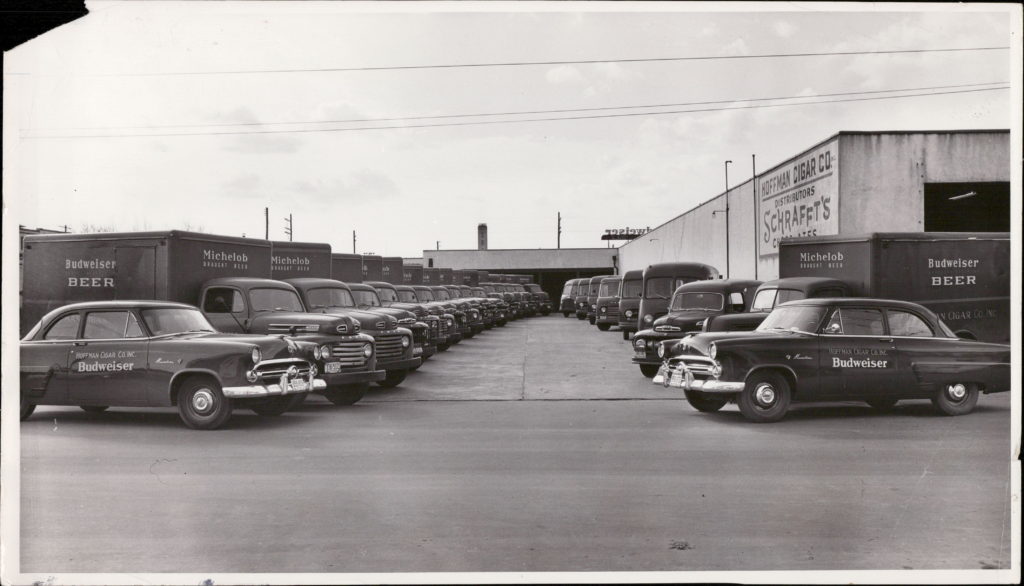
(What the distribution fleet looked like during the early days at Hoffman)
On December 29, 1925, the three Hoffman brothers sold 50 percent of their equity in Hoffman Cigar Company to Old Dominion Tobacco Company, owned by Leroy Webb Davis, great-grandfather of Robin Ray.
Following Prohibition (1920-33) — America’s 13-year ban on alcohol — St. Louis-based Anheuser-Busch again began producing beer and was seeking distributors in cities nationwide. In 1933, Anheuser-Busch appointed the Hoffman Cigar Company as a distributor for their beer and non-alcoholic products in Norfolk.
Anheuser-Busch selected distributors to serve specific geographic areas. Where Hoffman distributed its products to what today is considered the Southside of Hampton Roads, M. Price Distribution covered the Peninsula; Brown Distribution Company — also celebrating 100 years in 2019 — was awarded the Richmond region.
Anheuser-Busch, like Miller, Pabst and Coors, survived Prohibition by producing non-alcoholic beverages like malted milk, soft drinks and fruit juices. Anheuser-Busch also produced infant formula, carbonated coffee and tea products such as Kaffo and Buschtee.
Anheuser-Busch once operated a large, brick brewery in downtown Norfolk on Busch Street next to the USS Wisconsin slip. Part of the old brewery was used for what is today Harbour Place Condominium.
In 1962, the tobacco division for Hoffman Cigar Company was dissolved and focus was applied to the beer division, and in 1966, Hoffman Cigar Company began trading as Hoffman Beverage Company.
Prior to 1968, Hoffman had been headquartered in several locations in Norfolk including 222 Olney Road, 217 Bank Street (in 1926), and in the Railroad District just a block from where O’Connor Brewing Company sits today. They also leased additional warehouse space on Crawford Street in Portsmouth (in 1955).
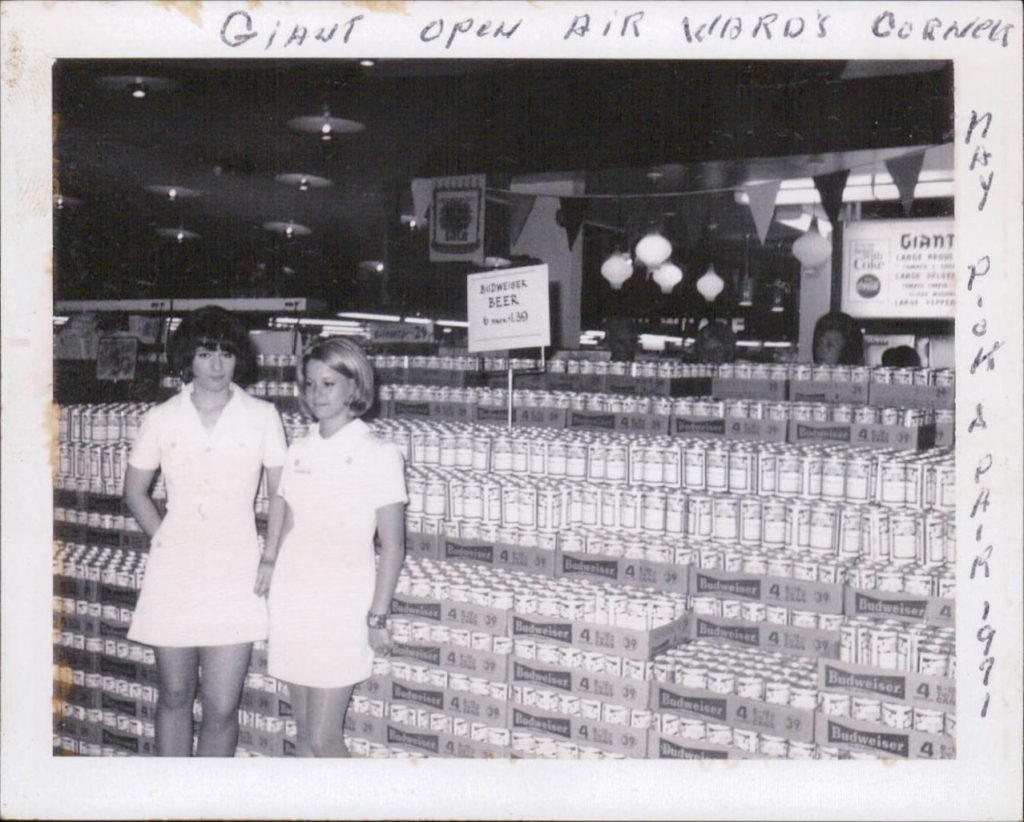
(Hoffman Beverage reps at the Budweiser display at Giant Open Air Ward’s Corner in 1971)
By 1968, Hoffman Beverage moved its headquarters to 5465 Greenwich Road in Virginia Beach to accommodate the need for additional space for the warehousing, delivering, and selling of Anheuser-Busch beer.
In 1983, Old Dominion Tobacco Company (doing business as Atlantic Dominion Distributors) purchased the remaining 50 percent of equity in Hoffman Beverage from the Hoffman family, and Robin Ray became chair of the board.
Hoffman Beverage Company took a chance in 2009 by breaking its contract to exclusively distribute Anheuser-Busch products. Hoffman did so that year when it acquired Legendary Distributing, a Richmond-based start-up craft distribution company, allowing Hoffman Beverage to start selling a variety of local and regional craft beers.
The addition of craft beers into their portfolio was forward-thinking on Hoffman’s part as then Governor Bob McDonnell, in 2012, signed Senate Bill 604 into law, thus allowing breweries to serve and sell beer from their tasting rooms. This opened the floodgates in Virginia where the number of craft breweries has exploded from roughly 26 in 2006 to over 300 today. The trend, though not as a result of what happened in Virginia, has spread across all 50 states. Demand for craft beer rose exponentially.
“I think Hoffman was ahead of the curve in terms of large distributors getting into the craft beer market,” said Porter Hardy IV, President of Smartmouth Brewing Company in Norfolk. “Hoffman’s been a crucial partner for us. They supported us from the beginning back when people weren’t sure if local beers and craft beer would really sell, when a lot of other distributors were still anxious from the ‘90s when there was that boom and bust (of craft beer). Back in 2012, you still had to convince people buy a local beer.”
Duke Fox, Vice President of Sales at Crozet-based Starr Hill Brewery, mirrors Porter Hardy’s appreciation of Hoffman Beverage.
“Greg White has been really ahead of the curve,” Duke said, specifically crediting Hoffman’s Vice President of Craft. “They are focused and committed to having a craft sales team led by Greg driving that business. Hoffman, unlike some of the other distributors around there, has been consistent on that approach, and I think that’s made a really difference in their ability to impact the marketplace.”
Arguably the most successful craft-style beer over the past five years across the Commonwealth of Virginia has been Vienna Lager, the multi award-winning lager produced by Lexington-based Devils Backbone Brewing Company. Steve Crandall, CEO and co-founder of Devils Backbone credits Hoffman Beverage for a big part of its continued success.
“We didn’t know the beer business initially,” said Crandall. “We made really great beer, but we didn’t know the business of beer. I think they clearly took a chance on us and they didn’t really expect our growth that came. I can remember the phone call from Greg White months after we signed-on with them, and he said, ‘Oh my God, we had no idea your beer would sell like this.’ There’s a big varying degree of quality in wholesalers, and they are one of the top ones without question. You’ve got to know how to approach buyers for retail outlets, grocery stores and all of that. Hoffman has been very supportive of us in the chain stores and that is how you get to a larger scale. If you don’t have that support it’s really challenging.”
The most visible local craft beer brand in Hampton Roads is Norfolk’s O’Connor Brewing Company. Their El Guapo Agave IPA seems to be everywhere.
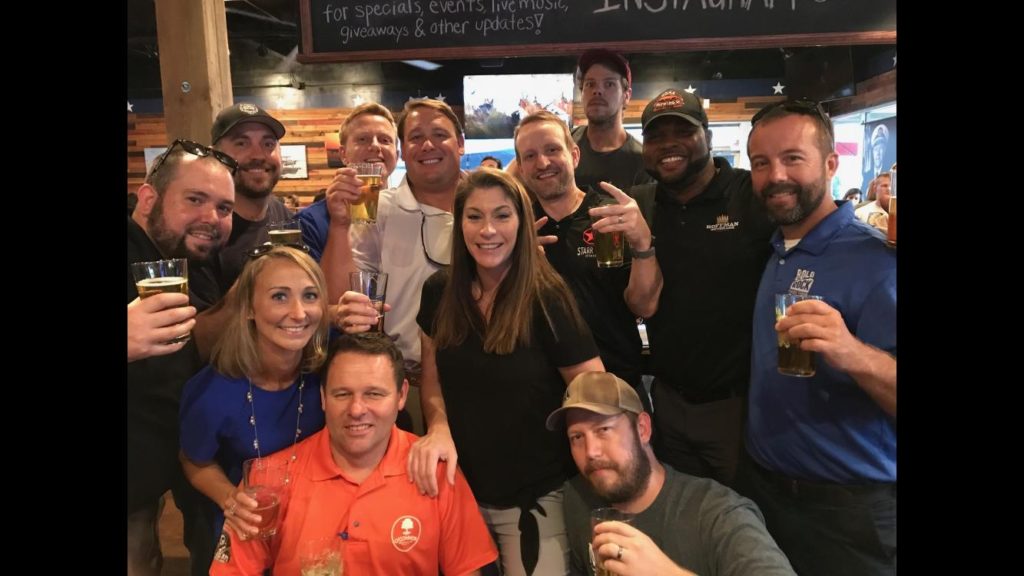
(The team from Hoffman Beverage turns out for a craft brewery “Keep the Glass” promotion at a local restaurant)
Early on after opening in 2010, Kevin O’Connor, founder/President of O’Connor Brewing Company, signed a distribution deal with Hoffman that has paid dividends ever since on multiple levels.
“They have played a huge role in my success so far,” O’Connor said. I couldn’t have asked for a better partner. They helped me get from zero to where I am today. They’ve always stood behind the product and offered advice. They helped educate me on the business.”
As O’Connor prepared to launch its Proper Lager earlier this year, the brewery worked with its distributor in getting much needed feedback and guidance on everything from the packaging design to whether an opportunity existed in the marketplace for a quality craft lager.
“The great think for us with Hoffman has been an open line of communication,” said O’Connor. “I try to have lunch as much as possible with the team over there. When we sit down for our quarterly meetings we talk about ideas we have, and then they’ll chime-in. Those guys and girls over there (at Hoffman) are beer people. They know good beer. They know what’s selling. They look at a lot of data.
“When were were launching Proper Lager we had a lot of conversations with them.”
Proper Lager was a sales hit right out of the gate and received national kudos as being one of the top craft lagers in the United States. This was an exceptional outcome for what is considered an established brewery in today’s craft scene.
Kevin O’Connor said Hoffman Beverage distributes over 100,000 cases of his beer on an annual basis. He’s been delighted with his partnership after nearly a decade with Hoffman Beverage.
“As they’ve been getting more and more brands in their portfolio they’ve not lost focus on us,” said O’Connor. “I think they’ve been good to the local brands they carry and I think they’ve treated everybody equally and fairly. What stands the test of time is the way they handle their business and all the help they’ve given me.”
Hoffman Beverage now represents products from 65 breweries and cideries and 13 non-alcoholic beverage companies, encompassing more than 600 beverage brands.
Hoffman Beverage Company continues to distribute all Anheuser-Busch products including Budweiser, Bud Light, Michelob Ultra, Natural Light, Busch Beer, Rolling Rock, Shock Top, and Landshark Lager.
The company’s craft beer portfolio is extensive and features such national brands as New Belgium, The Duck-Rabbit, Bell’s, Heavy Seas, Anderson Valley, Goose Island, Avery, Founders, Oscar Blues, Wicked Weed, Victory, Kona, DuClaw, Lagunitas, Sweetwater, Gordon Biersch, Southern Tier, and Weyerbacher.
Local and additional beers brewed in Virginia that Hoffman distributes include St. George, O’Connor, Smartmouth, New Realm, Bold Mariner, Legend, Alewerks, Back Bay, Cape Charles, Commonwealth, Young Veterans, Starr Hill, Center of the Universe, Devils Backbone, Port City, South Street, Champion, and Bold Rock Cidery.
In August 2017, Hoffman completed its $18 million expansion of its Chesapeake warehouse, which now serves as its consolidated headquarters with 256,000-square-feet of office space, a hospitality room, and warehouse facility of which 115,440 square-feet house the controlled environment warehouse. The building also has a fleet maintenance section to keep its trucks in great running condition. Wiegmann Associates won a Contracting Business Design/Build Award for the project.
This September, Hoffman Beverage Company will officially mark its 100th anniversary.
Virginia House Delegate Jason S. Miyares (R-82nd District) sponsored a bill (HR316) commending Hoffman Beverage Company on its milestone achievement back in February of this year. The bill passed and a proclamation will be presented to the company in September as it celebrates.
On my recent visit to Hoffman Beverage Company, Katherine Hines gave me the full tour of the facility, including an opportunity to try my luck down the corkscrew slide from the second floor, a gift from New Belgium Brewing Company. I declined her offer, but it looked fun.
Katherine Hines graduated from the University of North Carolina @ Chapel Hill with a business major. Hines spent time working for Hershey, Pepsi, and then Anheuser-Busch as an Innovation Product Manager in St. Louis. Her job was to work with outside advertising agencies and the ABI brewing & logistics teams to develop a 3-year innovation packaging and liquid pipeline for their brands.
Hines said she ultimately wanted to settle back in Hampton Roads and take on a leadership role to carry our family business forward into the 5th generation.
Following is my in-depth interview with Katherine Hines to learn more about the company’s past, present and future.
Looking back at the early history of the company, what do you find most interesting pre-1962?
The early days of any company are usually the most interesting as they often require constant change for survival. Along with just seeing some of those things, the other most interesting piece to me is the that the company used all of its profits to buy war bonds in 1944 and 1945. Since the military continues to be the backbone of our community and economy here, it’s nice to see the early connection and support the company had with them.
From your perspective, how important were nationally-run Budweiser branding advertisements to local distributors such as Hoffman Beverage?
The national marketing campaigns were very important and valuable to us here in this market when media was consumed in a very traditional and predictable way.
I might be oversimplifying things, but it felt like there was a pretty straightforward formula for success in the late 20th century: strong campaign content + media buys (radio, TV, outdoor) + local execution in the market (our people and retail execution). AB actually created a media buying group in house in the late 1980s (called Busch Media group ) so they became very familiar with the inter-workings of the media industry. Along with very strong creative content from their advertising agency partners, I believe that was a key factor in their success. They also helped educate us on impactful local media buys that would support their national campaigns.
Marketing today is infinitely much more challenging due to technological change. Media is now consumed so much more individually on demand and via cell phone. Consumers are looking for much more original and authentic content that’s relevant to their interests and needs.
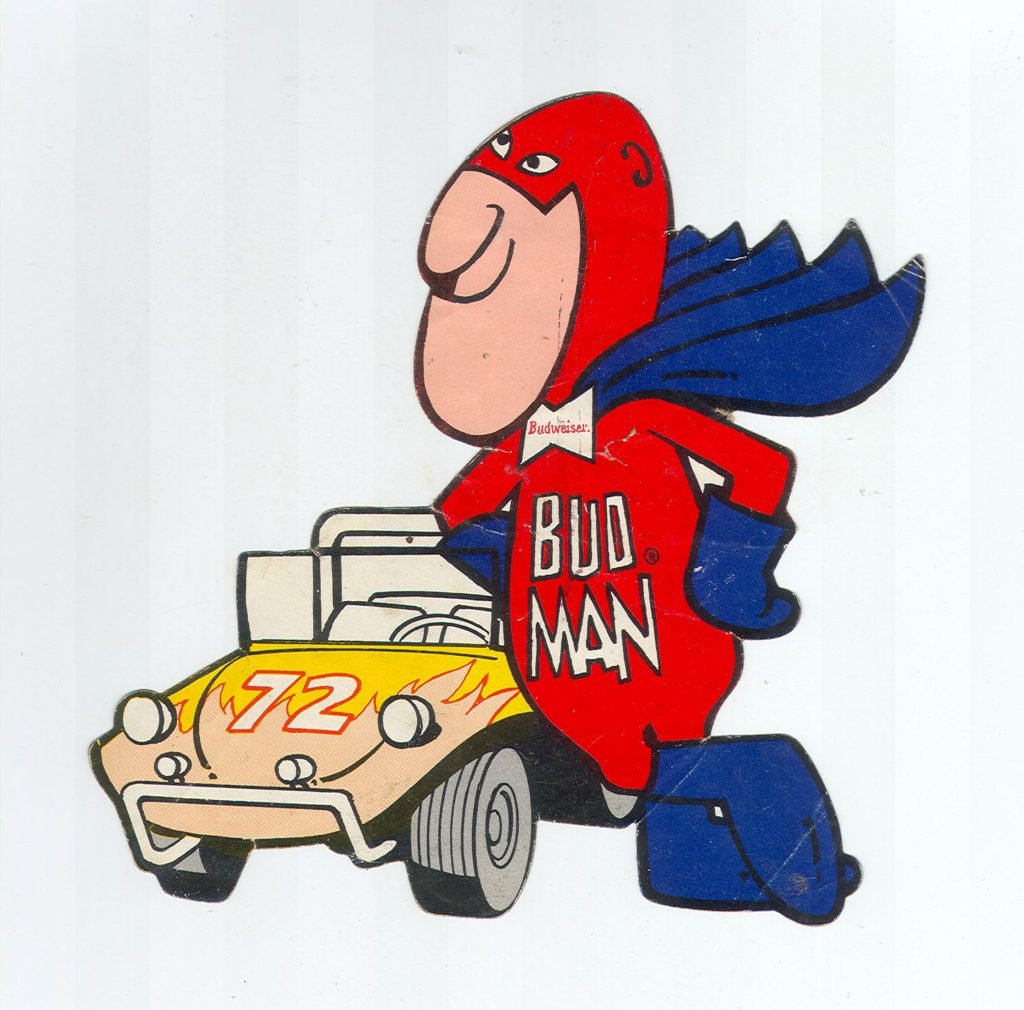
(Bud Man was an animated mascot for Budweiser in the early 1970s)
What were the key ingredients from a distributor’s perspective in making Budweiser the “King of Beers”?
The members of the Busch family (August Busch Jr and August Busch III) that led Anheuser-Busch through the later half of the 20th century when Budweiser took that crown created a culture centered around quality and dedication to excellence. I believe it was those things plus the “marketing machine” that they created at the same time that were the key ingredients.
Anheuser-Busch operated a large brewery in downtown Norfolk and then later in Williamsburg, where it continues to produce beer today. Was it helpful to Hoffman Beverage Company to have the manufacturing facility in close proximity and why?
Definitely. When the Williamsburg brewery, Busch Gardens, and Kingsmill opened in the 1970s, Anheuser-Busch become one of the largest employers in this area. I was very young at the time but remember the monorail that used to go from the theme park to the brewery for free beer tastings. Anheuser-Busch’s mission statement was “Making Friends is our Business” and they were truly committed to being immaculate hosts when people visited any of their facilities or parks. There’s no doubt in my mind that the positive experiences people in this area had up there in Williamsburg contributed to an affinity for those brands and stronger performance for them here on the Southside of Hampton Roads.
Being so close to the brewery then and still today helps us deliver the freshest beer to the marketplace each day. We get the beer here in our facility often the day after it’s brewed in Williamsburg and fresh beer is something we all can agree to love.
What were the expectations of both an exclusive distributor like Hoffman and Anheuser-Busch in terms of product placement in grocery store, restaurants, events, promotional materials (in retail locations), etc? Are there sales goals placed on distributors?
We meet annually with almost all of our beverage partners each fall in an “ABP” or Annual Business Plan meeting. This is actually my favorite “season” of the business year because it’s exciting for our team to see all of the new products and go to market strategies our partners have put together. In those meetings, we discuss sales goals and distribution objectives for their brands. We then work to come to a final agreement to specific numbers to track against over the following 12 months.
In terms of sales, what were the “golden years” for Anheuser-Busch products?
As the category leader in the beer, Anheuser-Busch’s historical sales trends very closely mirror those of the industry as a whole. So, as beer industry volume peaked in 2008, so did Anheuser-Busch from a volume perspective. But, over the past 11 years, we have watched a tremendous evolution in the beer category towards premiumization – consumers are trading up to more high- end and high-priced offerings like Michelob ULTRA, import brands and craft brands. So, a lot of people in the industry look at dollar share vs volume share these days. This trend is very consistent with what you see in other consumer product categories – people are buying more high-end waters, coffee, skincare products, and even pet food.
We are very fortunate that as a company, we have been able to capture a lot of the growth in the high-end space through both Anheuser-Busch and our craft brewery partners. Anheuser-Busch has pivoted their focus towards brands like Michelob ULTRA and Stella. We’ve seen this with accelerated marketing efforts on those brands and brand extensions like ULTRA Pure Gold and a new Stella Artois variant that’s coming this holiday season.
All of the craft brewers we have been privileged enough to work with these past 10 years are also as equally big of a factor in our success in the high-end space. Along with more premium offerings in beer, consumers are also looking for more variety. The amount of innovation in flavors and styles that our craft partners deliver every year to the market is remarkable. I honestly don’t know how they do it year after year.
As consumers became more health conscious, how did the introduction of Bud Light, Natural Light, Michelob Light, Busch Light and Michelob Ultra impact the market?
Light beers really began to gain traction and significant market share in the early 1980s with the introduction of Bud Light in 1982. I think Anheuser-Busch did a masterful job using humor in their advertising campaigns to make these light or “diet” beers become cool and acceptable mainstream choices for consumers. Who will ever forget Spuds Mackenzie or the Real Men of Genius radio commercials?
Michelob ULTRA had a similar challenge when it was launched as an even lighter choice twenty years later in 2002. That brand has found success tying itself to aspirational active lifestyle imagery. This is very consistent with what you mention above with a lot of Americans looking to become more healthy and fit but still wanting to allow themselves a little fun and occasional indulgence along that journey.
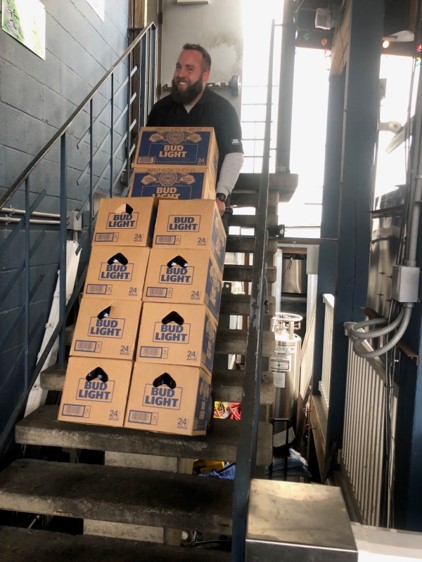
(Distributing beer sometime requires Hoffman Beverage pulling a hand-truck up a flight of stairs)
You shared with me a concern of financial risk that Hoffman Beverage Company took when it broke its AB exclusivity, in 2009, so as to distribute craft beers. What were those early projections of the potential upside to distributing craft beer products?
Anheuser-Busch was a strong believer in having a dedicated distribution networks for their brands and there were financial incentives in place over a decade ago around being an exclusive distributor. During the recent approval process for their merger with SABMiller, the US Department of Justice determined these incentives to be anti-competitive so they are no longer allowed. Back in 2009, we could see the success that craft was having in the western part of the US and the beginning of some of that industry to take root here in Virginia, so we made the decision to begin distributing beer outside of the Anheuser-Busch portfolio. It’s been an exciting journey for us the past 10 years establishing so many new business relationships with new partners. And it’s also been a lot of fun being a part of the entrepreneurial story and rise of so many local business owners here on the Southside like Kevin O’Connor, Porter Hardy, Michael Stacks, Josh Canada, Tom Wilder & Neil McCanon, Jeramy Biggie, and Chris Marshall.
Was it helpful that other distributors were also expanding into craft beer?
Absolutely. Craft brewers that have the desire to eventually gain space into chain retail stores like a Harris Teeter are typically required to have a distribution network across the state that can deliver those products to each store location. When recruiting a new partner that wants to be throughout Virginia, we offer to assist them in introductions to other distributors outside of Hampton Roads to make this path a bit easier on them.
What were the first few craft beers distributed by Hoffman Beverage Co?
Our first craft partners were actually through alliances with Anheuser-Busch – Redhook and Widmer in the mid-1990s and Starr Hill in 2006. We were awarded as the top performing Widmer Hefeweizen distributor with more taps than anyone else in the Eastern part of the US back in 2004. So, I guess those brands were technically how we cut our teeth on the craft side of the business.
We were fortunate enough to partner with Legendary Distributing in 2009 and bring on 23 new craft partners at the time. Some of the brands included in that were Legend, Lagunitas, Oskar Blues, Victory, and Southern Tier.
Was craft beer as easy “sell” to restaurants and retailers in 2009?
That depends on which part of our market you were in. For example, the accounts in the Ghent area of Norfolk were the earliest adopters of craft back in those days and were clamoring for these brands. Ten years later, that area has still the densest concentration of craft sales but you would be able to find our leading craft brands in every zip code across the area today.
How does Hoffman Beverage Company evaluate local, statewide, and national craft beers to be considered as an addition to your portfolio of products?
We take a team-based approach to every potential partner we evaluate. We review their product proposition and if it provides something unique to the marketplace that our other partners do not currently offer. We taste the product as a group and then have an open discussion where everyone gives feedback on the product and its potential to succeed in our market. We then collectively come to a decision.
Which non-Virginia craft beer brand is your most popular with consumers? Why do you think that is?
Some of our larger non-Virginia brands include Kona’s Big Wave (a Golden Ale), Founders All Day IPA, Elysian Space Dust IPA, and New Belgium’s VooDoo Ranger IPA.
Big Wave and All Day represent beers that are a little more flavorful than a traditional domestic light beer but maintain the same amount of sessionability. Space Dust and VooDoo Ranger are the opposite – they are big bold IPAs with higher ABVs. So, we attribute their growth to a larger number of consumers seeking more intense hop and alcohol characteristics in their beer.
Can you share your thoughts on the success of Devils Backbone Vienna Lager, O’Connor’s El Guapo, and Starr Hill’s The Love?
These beers represent some of the Virginia brands that had the earliest success in their style category and also the ability to resonate across the entire state of Virginia. More recently, we have seen consumers gravitate to hyper-local offerings and be less interested in Virginia brands that are not within a 50-mile radius of their homes. But I would commend Devils Backbone, O’Connor, and Starr Hill on their ability to maintain success with these original brands and simultaneously deliver innovative new offerings year after year to keep a very strong position they have within the state.
What are your top-selling beers made in Hampton Roads? Why are these flagship beers successful in your view?
We have so many incredible local brewers here in the 757 and I think there are reasons unique to each brewer and brand. Those could fill up another 10 pages of this publication. Here are the top selling brands for each of them and in alphabetical order by brewery:
Alewerks, Weekend Lager
Back Bay, Orange Crush IPA
Bold Mariner, Frogman Lager
Cape Charles, Cape Assateague IPA
Commonwealth, Wapatoolie
New Realm, Hoptropolis
O’Connor, El Guapo IPA
Sly Clyde, Injet Cider
Smartmouth, Game On IPA
St. George, Porter
Young Veterans, Pineapple Grenade
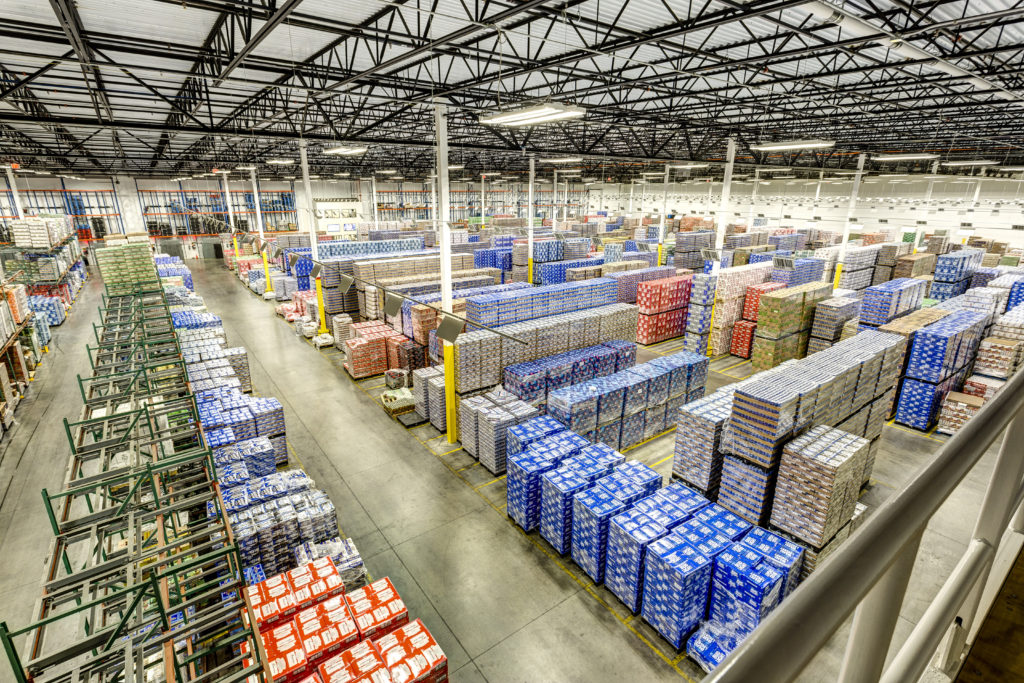
(A bird cage view of Hoffman Beverage Company’s warehouse)
Some national data indicate beer sales are flattening. What are you seeing in Hampton Roads?
Yes – that national data is accurate. We are fortunate to represent some of the best and highest performing craft brands in this market. As a result, we are experiencing growth at a higher pace than the national average. Hampton Roads tends to run pretty consistently at the national average in terms of the share of craft beer as a whole (around 14.2%) . When we see what’s happening in more advanced craft markets like Richmond or Northern Virginia, we think there is still significant growth potential here for craft.
Can you share specific percentages of Anheuser-Busch, import brands and top tier craft product sales or units sold in the Hoffman Beverage portfolio?
We keep that information confidential. I would venture to say that if those were published, every single partner in each of those segments would think they are not at the right share of our portfolio and I’d get a call the day after this is published from each of them. One thing I can tell you is that a lot of people don’t know we distribute non-alcoholic brands as well as beer. Some of the largest brands in that category for us are Bang Energy, Body Armor, Bai, Evian, and Core water. That segment is now close to reaching 10% of our total business.
How have the sales of import brands been impacted by craft beers?
There are actually still healthy growth trends in the import beer segment, it has been growing simultaneously along with craft most of the last decade. In the last set of IRI grocery scan data YTD 2019, imports and craft were about the same size here in Hampton Roads, 14.2% and 12.4% respectively.
Beyond beer, what trends do you see in terms of hard cider and hard seltzer? What growth potential do these have in your view?
Hard cider and hard seltzer definitely offer a large volume opportunity for us as a beverage distributor. Currently they sit as a combined 5.1% share of the market in the grocery IRI data. Those categories have both taken off tremendously in the last 5 years. A lot of these drinkers are trading wine or liquor for cider and seltzer which is a huge win for us as we have a limited wine portfolio and the state of Virginia distributes all liquor here. Longer term, I could see these two combining to almost double that share and be 7-9% of the market.
When you look to the future 5-10 years out, what do you envision as a distributor?
We are always looking to evolve as a company to meet the demands of both the consumer and the marketplace. Our company history speaks to that. The diversification from tobacco to beer in the first half of our fifty years and the addition of craft, imports, and non-alcohol to our portfolio over the last decade are good examples. We take tremendous pride in being the leader for beer distribution in this market and will continue to invest to maintain that position. We also know that to be successful at anything long-term, you have to be nimble, curious, and never complacent. So, we make it a priority to constantly be looking at ways we can improve and grow.
What do you have planned for the 100th anniversary celebration of the company?
This is a very exciting milestone for us. When I reflect on what’s made our company successful the first 100 years, it is unquestionably the level of talent, passion, and teamwork that all of the employees of Hoffman Beverage have committed to the company this past century. Although we spent a lot of time talking about brands in this article, the whole piece could have just as easily been about the accomplishments of our incredible team because they are what really makes us win every day. Display after display, tap after tap, case after case. There are a lot of other distributors that have the brands that we do across the country, but it’s really the time and effort that our people put in from the top to the bottom of the organization that has created the legacy and the market leadership that this company has here. In reflection of that, this year for us is about celebrating our people and continuing to invest in them as the real driver of our success for the next 100 years.
In terms of an official celebration, we are planning to have a big company carnival here onsite in September with all of our employees and their families. We are a family-owned company and preach that family comes first. So, we want to celebrate this year with not only our Hoffman family of employees but also their extended family as well.
Will everyone be handed a cigar for the occasion?
Ha! I’ll have to research which cigars pair the best with beer and cake and maybe set up a cigar lounge at the Hoffman Carnival.

